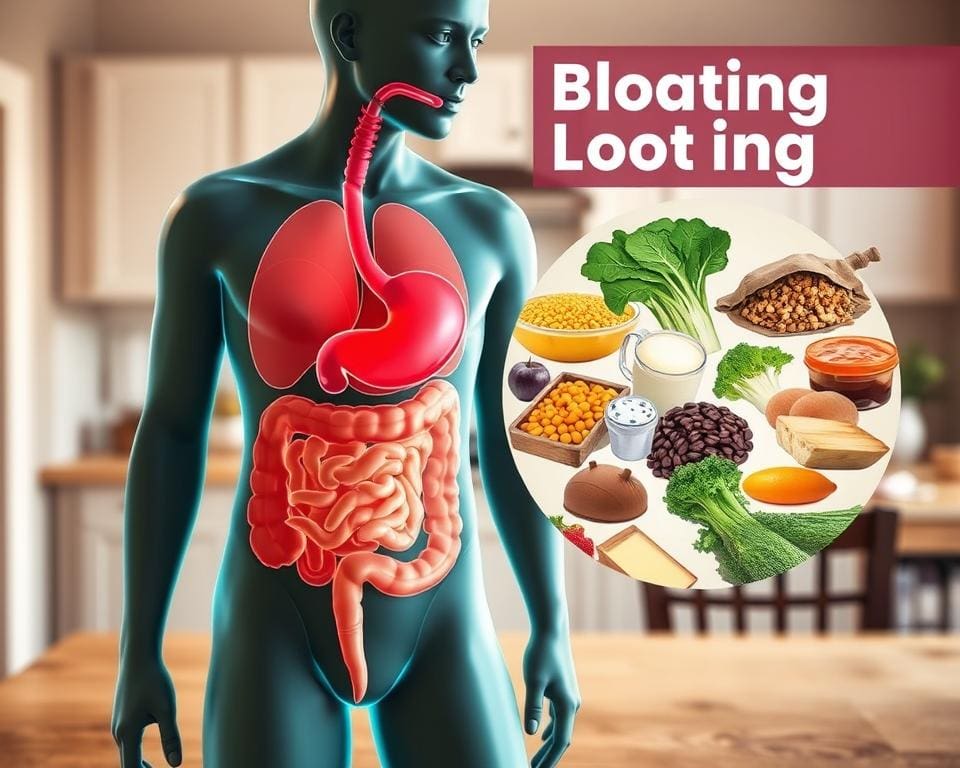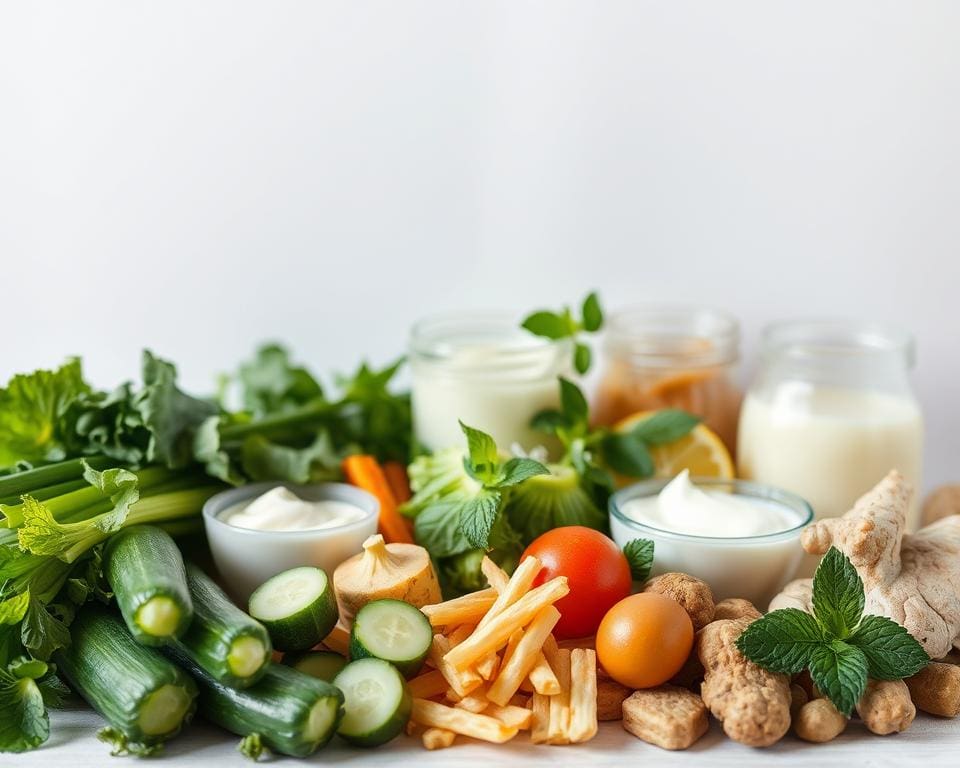Bloating is a prevalent issue that many encounter, often leading to discomfort and frustration. Understanding what foods prevent bloating is essential for improving overall wellbeing. Bloating prevention nutrition plays a significant role in alleviating symptoms and creating a more harmonious dietary experience. By identifying anti-bloating foods, individuals can take control of their dietary choices and enjoy a more comfortable lifestyle. This article will explore various foods and strategies, helping you to navigate towards a diet that is both effective in reducing bloating and rich in nutrition.
Understanding Bloating and Its Causes
Bloating can often be an uncomfortable and distressing experience, resulting from various factors within the gastrointestinal system. Understanding this phenomenon requires an exploration of how the digestive tract operates and which elements contribute to its disruption.
The Gastrointestinal System’s Role
The gastrointestinal system plays a pivotal role in processing the foods we consume. This complex network of organs is responsible for the digestion, absorption, and elimination of waste. When this system is compromised or overstimulated, it can lead to the accumulation of gas and fluids, ultimately resulting in bloating. Regular functioning depends on the health of the gut microbiome, which supports digestion, nutrient absorption, and overall gut health.
Common Triggers for Bloating
A wide range of factors can contribute to the causes of bloating. Common culprits include:
- Poor eating habits, such as eating too quickly or overeating.
- Food intolerances, particularly to lactulose or gluten.
- Consumption of carbonated beverages, which introduce excess air into the digestive tract.
Mindful eating practices can significantly aid in mitigating these symptoms. Certain foods to reduce bloating, such as those rich in fibre and probiotics, may enhance digestive health. Understanding these aspects can empower individuals to make dietary adjustments, potentially alleviating discomfort and promoting well-being.

What Foods Prevent Bloating
Exploring the right foods can be a turning point in preventing bloating and enhancing digestive health. Certain foods specifically serve as powerful allies against discomfort, promoting a smoother gastrointestinal process. Incorporating fibre-rich foods, probiotic-rich foods, and various herbs and spices can lead to significant relief. The following categories of anti-bloating foods provide a roadmap to a more comfortable and harmonious digestive experience.
Fibre-Rich Foods
Fibre plays a crucial role in digestion by promoting regular bowel movements and preventing constipation, a frequent contributor to bloating. Foods high in fibre include:
- Oats
- Chia seeds
- Broccoli
- Apples
- Legumes such as lentils and beans
Incorporating these fibre-rich foods not only aids in digestion but can also help reduce the sensation of fullness and discomfort commonly associated with bloating.
Probiotic-Rich Foods
Probiotics are beneficial bacteria that can significantly improve gut health. Including probiotic-rich foods in your diet can enhance digestion and balance gut flora, both crucial in bloating remedies with food. Consider adding:
- Yoghurt with live cultures
- Kefir
- Fermented vegetables, such as sauerkraut and kimchi
- Miso soup
These foods support a healthy digestive system, making them vital for anyone seeking effective foods that help with bloating.
Herbs and Spices for Bloat Relief
Many herbs and spices not only add flavour but also provide numerous digestive benefits. These natural remedies assist in relieving bloating:
- Peppermint
- Ginger
- Turmeric
- Chamomile
Including these anti-bloating foods in your daily meals can contribute significantly to overall digestive comfort and health.
Best Foods for Bloating Relief
When seeking relief from bloating, certain foods stand out as particularly effective. Incorporating these into a bloating reducing diet can enhance digestive comfort and overall well-being. Below are some of the best foods for bloating relief that can help you navigate your journey toward a healthier gut.
Ginger: The Natural Anti-Inflammatory
Ginger is celebrated for its potent anti-inflammatory properties. This versatile root can help soothe the digestive tract and ease bloating. Consuming ginger tea or incorporating fresh ginger into meals can provide significant relief. This makes ginger an essential part of a bloating prevention diet.
Yoghurt and Fermented Foods
Yoghurt and other fermented foods are rich in probiotics, promoting a balanced gut microbiome. These beneficial bacteria not only aid digestion but also play a crucial role in reducing bloating. Regular consumption of items like kefir and sauerkraut can bolster your bloating reducing diet and enhance nutrient absorption.
Melons and Other Hydrating Fruits
Fruits such as melons are excellent for hydration, which helps to flush out excess sodium and reduce water retention. They are low in calories and high in water content, making them ideal for anyone looking to support their digestive health. Including hydrating fruits in your diet aligns well with a bloating prevention diet and can mitigate discomfort.
Bloating Prevention Diet: What to Embrace
Embracing a bloating prevention diet involves making thoughtful choices that enhance overall digestive health. Integrating specific foods into daily meals can significantly impact comfort and wellbeing. Two main categories play an essential role in this diet: whole grains and lean proteins paired with healthy fats.
Incorporating Whole Grains
Whole grains are vital for a bloating prevention diet. They offer substantial fibre, which aids digestion and promotes regularity. Brown rice, quinoa, and oats stand out as excellent options. These foods to reduce bloating help keep the digestive system functioning smoothly while providing essential nutrients that contribute to overall health. Regular inclusion of whole grains can establish a solid foundation for a well-rounded eating plan.
Choosing Lean Proteins and Healthy Fats
Lean proteins like chicken, fish, and legumes are important components of bloating prevention nutrition. These foods provide sustenance without overwhelming the digestive tract. Pairing these proteins with healthy fats from sources such as avocados and olive oil ensures balanced meals. This combination supports a feeling of fullness while minimizing discomfort commonly associated with bloating. By crafting meals that combine these elements, individuals can work towards easing bloating while nurturing their bodies.
Foods That Help with Bloating
In the journey towards understanding what foods prevent bloating, it’s important to acknowledge the wealth of options available that offer relief. Foods that help with bloating often focus on natural ingredients that promote digestive health, ensuring your body remains balanced and comfortable. Incorporating a variety of anti-bloating foods can significantly enhance your wellbeing, providing a solid foundation for a varied and nutrient-rich diet.
Individuals may respond differently to specific foods; while some might find solace in the soothing properties of ginger and turmeric, others may thrive on the benefits of probiotic-rich yoghurt and fermented items. Exploring these diverse options is vital as you discover which foods work best for your unique digestive system. Remember, the key is to listen to your body and make dietary adjustments that cater to your personal needs.
Ultimately, taking the time to experiment with various foods that help with bloating will empower you to take control of your digestive health. Emphasising fresh, hydrating fruits, fibre-rich vegetables, and wholesome grains can lead to a more comfortable gut. Embrace these changes and discover a personalised approach to managing bloating that enhances your overall quality of life.









